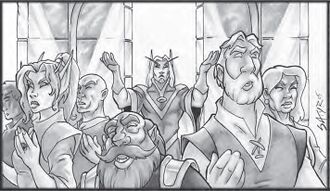Religion
- This article is about the universal explanation. For a list of categories and articles related to religion, see Category:Religions.
“How typical of little beings to look for something outside themselves to praise.”
- — Imperator Mar'gok's thoughts[1]
Religion can be defined as a system of beliefs, practices, rituals, and moral codes followed by various races, factions, cults, and religious institutions within the Warcraft universe. These belief systems often involve worship or reverence towards deities, spirits, ancestors, supernatural beings, elementals, nature itself, or cosmic forces. From monotheistic cults such as the Sisterhood of Elune, to polytheistic faiths like the worship of the loa, including nature-based spirituality and ancestral worship, these religions encompass a wide range of beliefs and traditions. Unlike gods, most demigods have never been the objects of worship. Few demigods have temples built in their honor, and priesthoods based on the worship of a demigod are extremely rare. Nevertheless, demigods have been revered in the past, and some of them continue to be respected today.[2] For a list of all known cults and sects see here.
On Azeroth and beyond, the priests (and their variants) are devoted to the spiritual, and express their unwavering faith by following their chosen deity or philosophy through religious institutions. They possess magical abilities tied to their faith and guide the spiritual destiny of their people. Churches, chapels, cathedrals, temples, and sanctums are notable places where the devoted can practice their faith and perform spiritual rituals. Each race has its own funeral rites according to their culture and beliefs, whether by burials, cremations, or other processes.
Heresy is any belief, practice, or theory that is strongly at variance with established beliefs in a society. Heretics are denigrated as pariahs by their people, and subsequently rejected, exiled, or eliminated. Blasphemy is an insult that shows contempt, disrespect, or lack of reverence concerning a deity, a sacred object, a religion, or something considered inviolable, such as a set of doctrines and teachings. Fanatic religious cults, such as the Scarlet Crusade and the Twilight's Hammer, condemn to torture and death those who utter or embody what they deem blasphemous.
In the RPG
- See also: Religious community
Most races possess some sort of cultural faith that reflects their values, fears, and hopes. Races sometimes personify their faiths in the form of a god, but members of the race understand that their “god” is really just a symbol of their philosophical beliefs, not an actual being. Some, however, see actual beings as gods or demigods that do exist (either as a God, gods, or demigods is debatable among the races themselves), such as those who view Cenarius as a demigod. Others, such as the titans, are seen as beings that actually exist, not symbolism for philosophic beliefs. Others, such as Firelord Ragnaros, are seen by some to have achieved a god-like status. Most racial faiths include the concept of an afterlife, along with cultural mores and taboos to indicate the correct path to the afterlife. Spiritual leaders who guide their race along the proper philosophical path tend to be shaman or druids. Few races revere an actual deity to whom they can dedicate their lives as priests.[3]
Many independent factions follow the same faiths or philosophical leanings as Horde and Alliance members. Some factions possess unique interpretations of these mainstream faiths, however, and others follow paths unknown to the more established factions. Cosmetic changes in the nature of worship are not enough to separate a truly independent faction from the rest of the church. Slightly different rituals, name changes or new titles merely indicate a new denomination. Independent factions show their uniqueness with completely different interpretations of the doctrines of the faith. In some cases, these factions might seem completely at odds with their parent organization, but claim to still follow the organization’s tenets at heart. Some faith-based organizations marry several different factions who follow the same philosophy in different ways, and have agreed to ally in order to accomplish a mutual goal.[4]
References
- ^ Code of Rule
- ^ The Warcraft Encyclopedia/Demigods
- ^ Dark Factions, pg. 88
- ^ Dark Factions, pg. 86
| |||||||||||||||||||||||||||||
| |||||||||||||||||||||||||||||||||||||||||||||||||||||||||||||||||||||||||||||||||||||||

